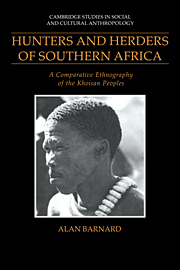Book contents
- Frontmatter
- Contents
- List of figures and maps
- List of tables
- Preface
- A note on orthography
- Part I The Khoisan peoples
- Part II A survey of Khoisan ethnography
- 3 The !Kung
- 4 The !Xõ and Eastern ≠ Hoã
- 5 The Southern Bushmen
- 6 The G/wi and G//ana of the central Kalahari
- 7 The Eastern and Northern Khoe Bushmen
- 8 The Nharo
- 9 The Cape Khoekhoe and Korana
- 10 The Nama and others
- 11 The Damara and Hai//om
- Part III Comparisons and transformations
- References
- Index
- Cambridge Studies in Social and Cultural Anthropology
3 - The !Kung
Published online by Cambridge University Press: 05 June 2012
- Frontmatter
- Contents
- List of figures and maps
- List of tables
- Preface
- A note on orthography
- Part I The Khoisan peoples
- Part II A survey of Khoisan ethnography
- 3 The !Kung
- 4 The !Xõ and Eastern ≠ Hoã
- 5 The Southern Bushmen
- 6 The G/wi and G//ana of the central Kalahari
- 7 The Eastern and Northern Khoe Bushmen
- 8 The Nharo
- 9 The Cape Khoekhoe and Korana
- 10 The Nama and others
- 11 The Damara and Hai//om
- Part III Comparisons and transformations
- References
- Index
- Cambridge Studies in Social and Cultural Anthropology
Summary
Introduction
The !Kung consist of three main ethno-linguistic groups: the Central !Kung of Botswana and Namibia, the Northern !Kung of Angola, and the ≠ Au//eisi, or Southern !Kung. In her comparative dictionaries of Bushman languages, Dorothea Bleek (1929a; 1956) designated these groups Nil, NIII, and NI respectively (the initial N identifying these as ‘northern’ Bushman languages). Several anthropologists and linguists now use the indigenous designation Zu/'hoãsi (‘real people’, also spelled Ju/wasi), or the short forms Zu or Zhu (‘person’), or Zu/'hoã (‘real person’, singular), to designate the Central !Kung. The !Kung proper, in a sense, are actually the Northern !Kung, the only group who use the term !Kung (!xũ, another word for ‘person’) as an ethnic self-appellation. The ≠ Au//eisi are distinguished from the ‘!Khũ’ or ‘Kung’ in early ethnographic accounts, but there is no question that their relationship to the others is close enough to consider them a branch of the same ‘people’. Following current practice among ethnographers who have worked with them, I retain the indigenous plural suffix -si in ‘Zu/'hoãsi’ and ‘ ≠ Au//eisi’ when using these terms as plural nouns.
Traditionally, these three labels identify indigenously defined dialect areas, but they also correspond roughly to cultural units and environmental zones (see Figure 3.1). It is difficult to estimate the !Kung population. In total, they may number as many as 25,000 or even 30,000, although most estimates given in anthropological accounts as well as official censuses are much lower (cf. Marshall and Ritchie 1984: 14–28; Gordon 1986a).
- Type
- Chapter
- Information
- Hunters and Herders of Southern AfricaA Comparative Ethnography of the Khoisan Peoples, pp. 39 - 61Publisher: Cambridge University PressPrint publication year: 1992

